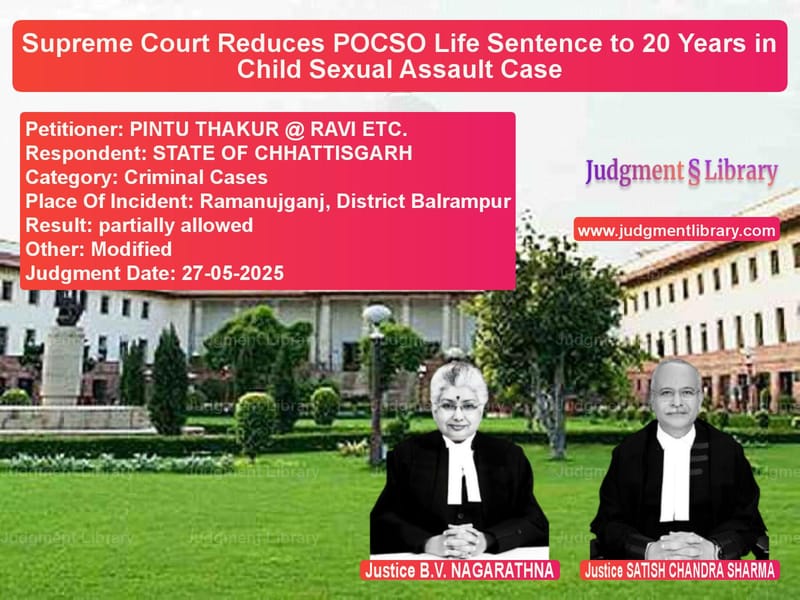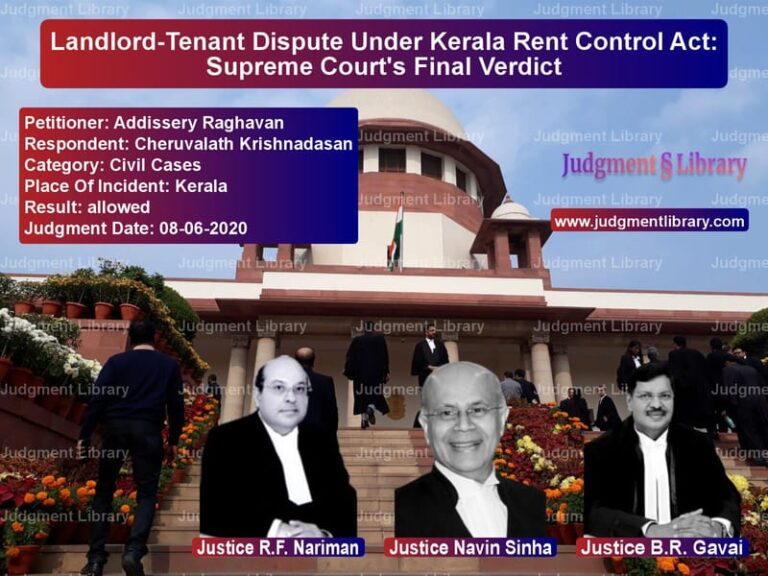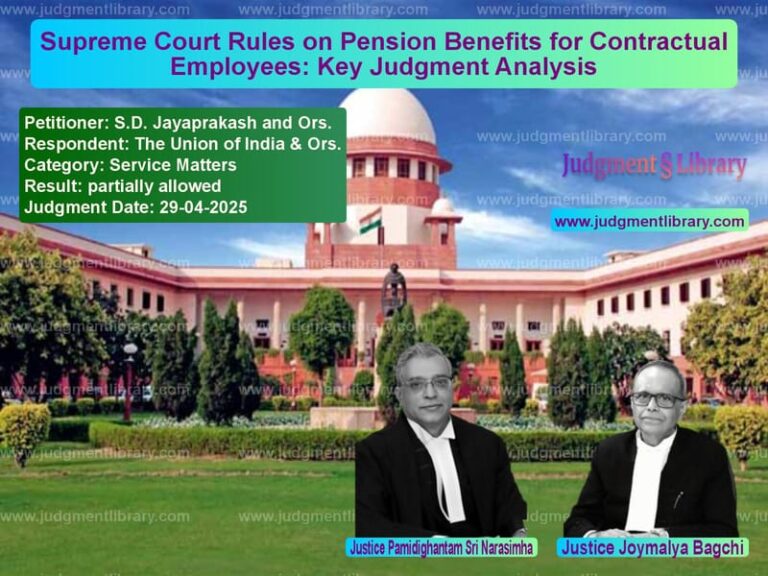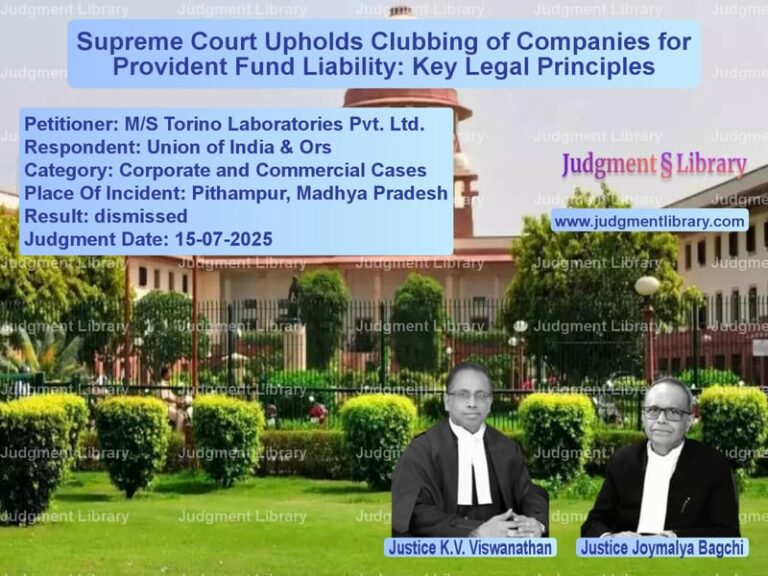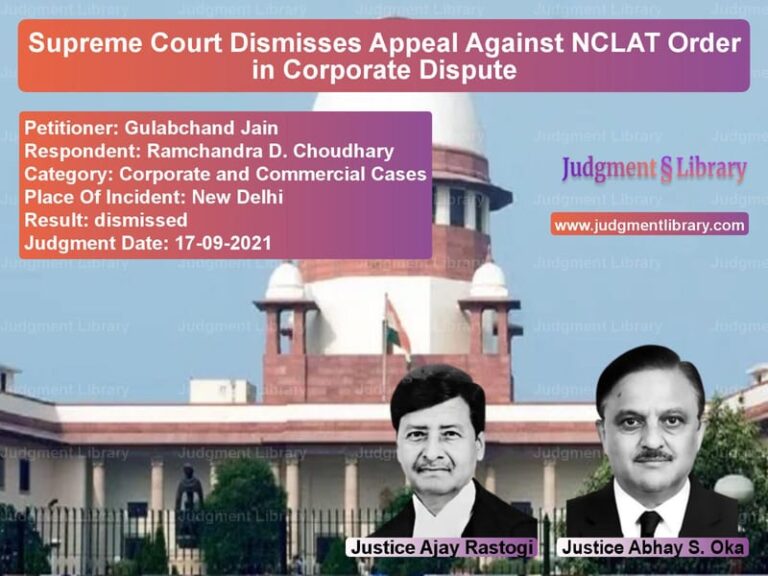Supreme Court Reduces POCSO Life Sentence to 20 Years in Child Sexual Assault Case
In a significant ruling that balances the severity of child sexual assault crimes with considerations of youth and sentencing principles, the Supreme Court of India has partially allowed an appeal by two convicts sentenced to life imprisonment for the remainder of their natural lives under the Protection of Children from Sexual Offences (POCSO) Act. The case involves Pintu Thakur @ Ravi and another appellant who were convicted for aggravated penetrative sexual assault under Section 6 of the POCSO Act along with other offenses under the Indian Penal Code.
The legal journey began with their conviction by the Additional Sessions Judge Fast Track Special Court (POCSO Act) in Ramanujganj, District Balrampur in Special Sessions (POCSO) Case No.36/2020. The trial court had convicted them under multiple sections including Section 363 (kidnapping), Section 366 (kidnapping or abducting woman to compel her marriage), Section 342 (wrongful confinement) of the Indian Penal Code, and most seriously, under Section 6 of the POCSO Act for aggravated penetrative sexual assault.
The Sentencing Controversy
The trial court imposed severe sentences including five years rigorous imprisonment for kidnapping offenses, one year for wrongful confinement, and most significantly, “imprisonment for life which shall mean imprisonment for the remainder of natural life” under Section 6 of the POCSO Act along with a fine of Rs.15,000. All sentences were directed to run concurrently. The High Court of Chhattisgarh subsequently affirmed this judgment of conviction through its order dated April 26, 2024, in Criminal Appeal Nos.1686/2023 and 2130/2023.
Aggrieved by this affirmation of both conviction and sentence, the appellants approached the Supreme Court through Special Leave Petitions, which were converted into criminal appeals.
Arguments Before the Supreme Court
Before the Supreme Court bench comprising Justice B.V. Nagarathna and Justice Satish Chandra Sharma, the appellants’ counsel made a two-fold submission. “Firstly, he contended that the very conviction of the appellants by the Additional Sessions Judge Fast Track Special Court (POSCO Act) Ramanujganj, District Balrampur in Special Sessions (POCSO) Case No.36/2020 was erroneous.”
Secondly, and more significantly for the outcome of the case, the counsel argued for sentence reduction. “Secondly, it was submitted that if this Court is not inclined to interfere with the conviction of the appellants then at least the appeals could be considered vis-a-vis reduction in their sentence having regard to Section 6 of the Protection of Children from Sexual Offences Act, 2012 (for short, ‘POCSO Act’). He contended that the minimum sentence under Section 6 of the POCSO Act is twenty years whereas the Trial Court has imposed life imprisonment for the remainder of the natural life which is a harsh punishment.”
The counsel emphasized the youth of the appellants at the time of the incident and their period of incarceration. “It was submitted that the appellants at the time of the incident were in their early twenties and have completed a little over five years of incarceration.” Based on these factors, he requested that the appeals be allowed.
The State of Chhattisgarh, represented by its standing counsel, strongly opposed the appellants’ contentions. “Per contra, learned standing counsel for the respondent State vehemently objected to any of the contentions raised by the appellants herein being accepted. He submitted that the High Court has rightly affirmed the judgment of conviction which has been rendered by the Trial Court.”
Regarding the sentencing aspect, the State counsel argued that “Further the sentence of life imprisonment which shall be imprisonment for the remainder of natural life is in accordance with Section 6 of the POCSO Act. Therefore, there is no merit in this appeal.”
The Court’s Deliberation
The Supreme Court bench noted that “We have given our anxious consideration to the arguments advanced at the Bar.” After careful consideration, the Court determined that “We are not inclined to interfere with the judgment of conviction passed by the Special Court and which has been affirmed by the impugned order.”
However, the Court found merit in the second submission regarding sentencing. The bench carefully examined Section 6 of the POCSO Act, which states: “6. Punishment for aggravated penetrative sexual assault.– Whoever, commits aggravated penetrative sexual assault, shall be punished with rigorous imprisonment for a term which shall not be less than ten years but which may extend to imprisonment for life and shall also be liable to fine.”
The Court observed that “On a reading of the same, we find that the minimum punishment delineated under the said Section is twenty years but which may extend to imprisonment for life which shall mean imprisonment for remainder of natural life of the accused and shall be liable to fine or with death.”
The bench noted an important aspect of the trial court’s sentencing approach: “The Special Court has not ordered death penalty but has not considered any mitigating circumstance in the instant case, instead the higher punishment of life imprisonment for the remainder of natural life of the person has been imposed which has been affirmed by the High Court.”
Factors Considered for Sentence Reduction
The Supreme Court identified several crucial factors that warranted reconsideration of the sentence. First, the Court emphasized that “However, the minimum sentence under Section 6 of the POCS0 Act is twenty years.”
Second, the Court considered the age of the appellants at the time of the offense, noting that “Bearing in mind the fact that the appellants herein were in their early twenties when the incident took place” and that “the fact that now they have completed only five years of incarceration and even for completion of the minimum sentence it would mean another fifteen years.”
The Court projected the implications of the minimum sentence on the appellants’ lives: “We find that the appellants are now in their mid-twenties and even if the minimum sentence is to be completed they would be in their early forties.”
The Final Ruling
After weighing all considerations, the Supreme Court concluded that “We find that the interest of justice would be served in the instant case, if we reduce the sentence imposed on them from imprisonment for life which shall mean imprisonment for the remainder of natural life to twenty years.”
The Court accordingly “Consequently, we allow the appeals in part by reducing the sentence to twenty years.” and directed that “The appeals are allowed in part in the aforesaid terms.”
Legal Significance of the Judgment
This judgment represents an important interpretation of sentencing principles under the POCSO Act, particularly concerning the discretion available to courts between imposing the minimum sentence of twenty years and the maximum sentence of imprisonment for the remainder of natural life. The Supreme Court’s ruling acknowledges that while crimes against children demand severe punishment, courts must also consider individual circumstances, including the age of the offenders at the time of the crime and the proportionality of punishment.
The decision underscores that the sentencing discretion under POCSO Act provisions should be exercised judiciously, considering both the gravity of the offense and the mitigating factors specific to each case. By reducing the sentence from natural life imprisonment to the statutory minimum of twenty years, the Court has balanced the need for deterrence and retribution with considerations of the offenders’ youth and the potential for rehabilitation.
This ruling may serve as an important precedent for future cases under the POCSO Act where courts are required to determine appropriate sentences within the statutory range, particularly when dealing with young offenders. It reaffirms the principle that sentencing must be individualized and proportionate, taking into account all relevant circumstances while still respecting the legislative intent behind creating stringent punishments for sexual offenses against children.
The judgment also highlights the Supreme Court’s role as the final arbiter in ensuring that sentencing practices align with both legal requirements and principles of justice, even in cases involving particularly heinous crimes where societal outrage might demand the harshest possible penalties.
Petitioner Name: PINTU THAKUR @ RAVI ETC..Respondent Name: STATE OF CHHATTISGARH.Judgment By: Justice B.V. NAGARATHNA, Justice SATISH CHANDRA SHARMA.Place Of Incident: Ramanujganj, District Balrampur.Judgment Date: 27-05-2025.Result: partially allowed.
Don’t miss out on the full details! Download the complete judgment in PDF format below and gain valuable insights instantly!
Download Judgment: pintu-thakur-@-ravi-vs-state-of-chhattisgar-supreme-court-of-india-judgment-dated-27-05-2025.pdf
Directly Download Judgment: Directly download this Judgment
See all petitions in Sentencing Guidelines
See all petitions in Juvenile Justice
See all petitions in Judgment by B.V. Nagarathna
See all petitions in Judgment by Satish Chandra Sharma
See all petitions in partially allowed
See all petitions in Modified
See all petitions in supreme court of India judgments May 2025
See all petitions in 2025 judgments
See all posts in Criminal Cases Category
See all allowed petitions in Criminal Cases Category
See all Dismissed petitions in Criminal Cases Category
See all partially allowed petitions in Criminal Cases Category

